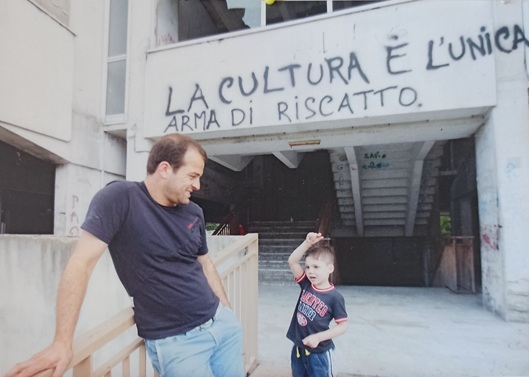Investing for children: a journey to start today.

Mortgage, current expenses, unforeseen expenses, how to find ways of investing in the future of your children?
Investing in the future of young children: a brilliant idea.
Anyone, like me, who has grown-up children who have embarked on a course of studies, knows how useful it can be to have available a small fund set aside to face the huge expenses that this path entails.
Getting to that point in life, without the necessary resources, can be not only frustrating but can induce anxiety and a sense of precariousness in parents as well as requiring important sacrifices and renunciations.
We all know well the difficulties that families encounter in everyday life, we are all well aware of what level the cost of living has reached, how challenging it is to deal with the purchase of the first home for young couples, how much sense of responsibility and at the same time unawareness requires taking on such important and lasting commitments.
The average salaries of young people in Italy are particularly inadequate to face the birth of a new family and often, the parents of these children are themselves in difficulty in helping their children.
The beautiful thing is that many young people are extremely motivated and resilient and face difficulties and sacrifices with great selflessness to build their project and grow the family of their dreams over time.
Others unfortunately give up or let themselves be taken by discouragement and a sense of impotence.
It is not a question here of the level of income or of having well-to-do parents who provide for the needs of their children.
Often, those who have more possibilities pursue a whole series of "necessities" that lead only to higher expenses and lifestyle inflation: the need for a house too big, a holiday too far away, a car too expensive and so on, even with a good salary, to always stay on that survival threshold, beyond which you risk default.
In such a scenario, investing for children may seem a remote and inaccessible hypothesis.
This is not the case and it is good to say so and let young people know that they have in their hands a formidable weapon that often do not even consider and that in this path can really make a difference: time.
Investing for children: a matter of time and method.
That investment is a necessity tells us the concrete data, the fact that pensions are less and less certain, that the support of welfare is increasingly scarce in all areas: school, health, social services, everything helps us to understand how it is necessary to help ourselves in the future.
To do so, there are two variables that matter and that can allow us to reach the objective of investing, first for ourselves and then for our children, with a certain serenity: time, as we said, and the method.
The best time to invest is now.
Not in the future, not when I earn more, not when I get a raise, not when I receive an inheritance or when I start my second job, the time to invest is now.
Set aside a monthly quota, right at this moment, also with the mortgage, even with the instalments, even with the debts.
Now.
Because even a very small amount will grow over time; Even an insignificant figure today, set aside with persistence, will become a small but significant capital, which will be able to give freedom and security not only economically, but above all in itself.
How to create capital with a low income?
Make family budgeting with care and spend with intentionality.
Creating a budget is the essential prerequisite to have your finances under control and to know where you are going and how you want to get there.
Concretely, if I don’t know how and where I spend my money, I won’t be able to control my expenses and give a direction to my savings.
The first step, if you have not already done it, is to trace with meticulousness all the expenses, from the most important, to the smallest and apparently insignificant but that, if repeated over time, can really become significant even without you noticing.
Track your expenses on a savings app, or on a simple notebook, no matter the way, it matters to do it until you become good enough to know where and how
We commit our resources every month.
Which categories of expenditure we are already good at and which ones we can improve on, perhaps with little effort. In other words, what are the things that are really worth spending on and which, those that maybe do not bring us so much value to be kept.
How to understand what it is really important to spend on?
Each good we buy must be worth:
- the time we spend away from our loved ones working
- the effort and commitment we put into work
- Our present and future well-being
if a purchase meets these criteria can be retained, otherwise, simply not.
Once we track our spending, once we identify areas where we can improve the use of our resources, once we understand what we believe is really useful and rewarding to spend our hard-earned money, it’s time to start structuring our budget, By deciding...
How to divide our earnings into percentages.
Give our salary a breakdown by area of expenditure, based on fixed percentages.
To do this, it is obvious that you must first have mastered the control of expenditure, and then ask yourself:
- How much do I spend each month on recurring expenses: food, bills, transport, rent, mortgage?
- as for extraordinary expenses such as: repairs, medical expenses as for holidays, hobbies, entertainment expenses
- And finally, how much can I save?
Answering these questions will give us a clear picture of where we are going financially.
The result may be merciless, but it is absolutely necessary to do so in order to regain financial freedom, reduce stress and give a deliberate direction to our work.
It can be natural to say: if my salary was higher... that my friend/a earns more... Guy is helped by his parents... Caio has inherited...
It’s natural, but we don’t need it to grow.
We must be aware that it is possible to do better and that often we do not need more resources but only learn to use existing ones, in a more intentional and conscious way.
To return to the spending percentages, what we can do is turn our eyes completely on our budget and start, in the words of G. S. Clason’s book The Richest Man in Babylon, paying first ourselves.
Establish a quota, even small, to save for your needs, your serenity and your future pleasure and set it aside before making any other purchases.
Set it aside, perhaps automatically, on a savings account and forget to have it or, better yet, invest it in something that, over time, protects it from inflation and makes it grow.
The secret of a constant and progressive growth, lies in that small figure.
Our future well-being lies in that small number.
Our projects and the children’s education, may be one of them, lie in that small number.
Simple but effective.
Does it seem impossible to you today, because your income is barely enough to support your current expenses?
Try playing with percentages of your budget.
Start from recurring expenses: 50%?
If you can stay in this percentage you already have a large margin, if you can not, try to work on the rest, reducing other expenses.
I know that it is difficult and unpleasant, especially when you are young but it is really so effective.
Create first of all a small emergency fund, to draw in the case of extraordinary expenses and then go to complete the other items:
10% savings and investment, 60% recurring expenses especially if you have a mortgage, 10% expected and foreseeable expenses (the dentist, the new car, an extraordinary repair)
10% fun, the remaining 10% put it in the area that is most important to you, maybe the future of the children.
Already with this simple setting, you recover clarity and space for intentionality.
Intentionality means for me, deciding what to do with your hard-earned money and how, why, with whom to do it, without letting the case, inexperience or marketing decide for you.
It may seem a shirt too tight and binding, it may be frightening but it is powerful and really liberating to decide with awareness what has priority for us and make our choices accordingly.
There are still two important points for the route.
How to split expenses when you’re in pairs.
Each couple chooses their own setting, which original and which inherited from the parents.
If you ask around you will see that there are really many different ways to deal with this, such as: she pays the expenses and he the bills, she does not have a current account of his own and he manages everything, or they divide equally the expenses by tracing them and contributing each for his part.
Much depends on the type of income and revenue, but I think that dividing expenses equally, if possible in half, helps to empower both and especially to keep your feet firmly planted on the ground, without running forward, Faced with expenses which it is perhaps better to postpone or not at all.
The initial clarity on this point is very important, it helps to reduce stress and quarrels that arise from unspoken or misunderstandings.
And a last fundamental point is also the decisive one.
Why is it important for me/us to invest? Children, holidays or something?
When you start a couple’s journey, you come from two different stories, from families that have different origins and it is not always easy to find a common ground on which to proceed but it is really important to do so or at least try, in order to reach a balance over time.
To ask why it is important for us to save and then invest, will help us to grow in clarity and security in ourselves, making us able to understand that even in this union there is strength and that a cohesive couple in the choices of saving and investment, It goes much further than one that is not.
Everyone makes their own choices based on their values, of course.
But if you really care about the future of your children, maybe even very young, offer them the most valuable thing: a good education and to be able to do it prepare yourself today, do not wait.
Give them the opportunity to study, to grow as men and women of value and I say it with the words of this image, captured by photographer Davide Cerullo, on a wall of Scampia.

Culture is the only weapon of redemption.
In Italy the social elevator seems to have been broken for many years now, but in other countries the fact that a young person goes beyond the path taken by his parents is considered a factor of merit.
For example, being the first graduate of the family is considered an achievement to be supported and rewarded, economically and concretely.
When making our spending or investment choices we also take this into account and the fact that being educated is an incalculable advantage that we can give to our children thanks to our informed choices today.
Good job!
Designed by Freepik


